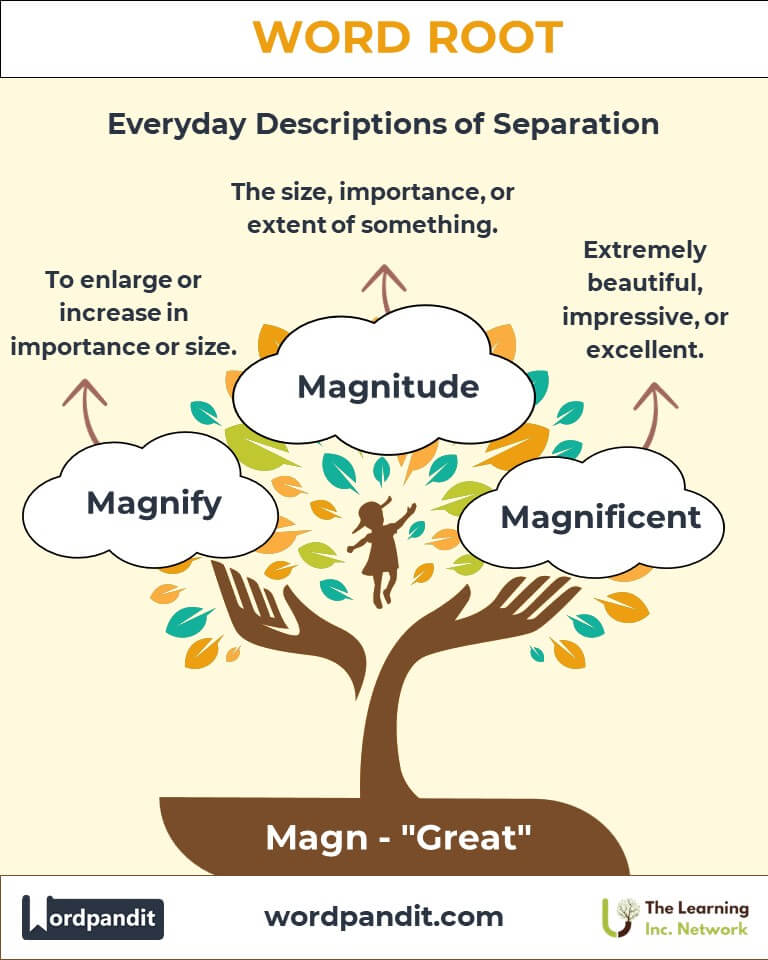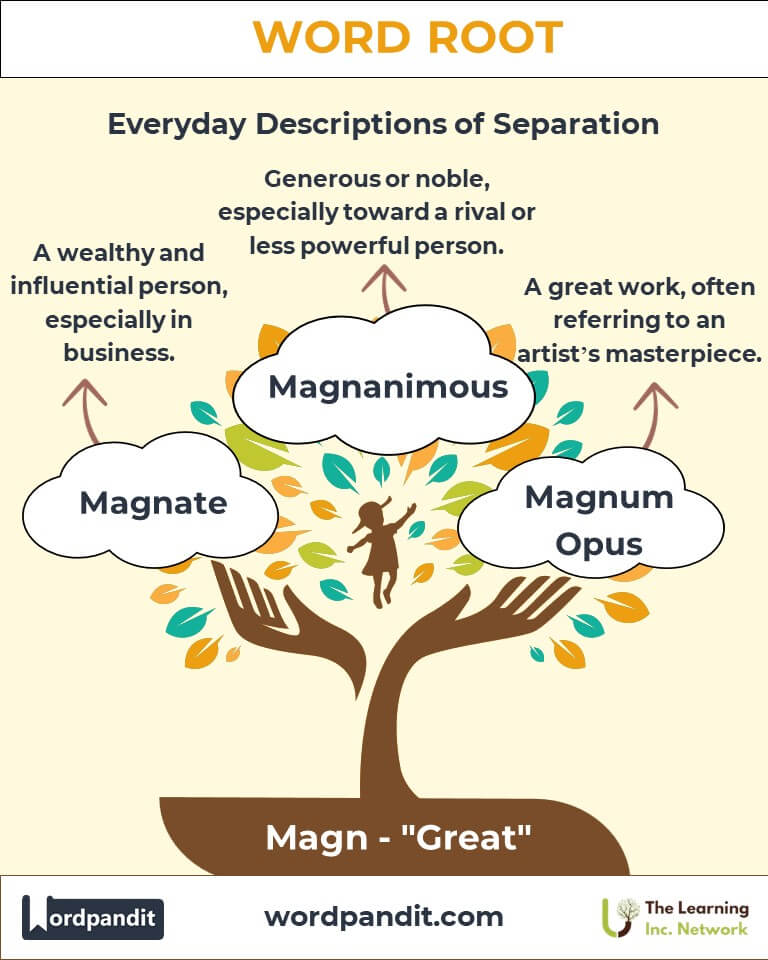Magn: The Greatness of Words in Language and Thought
Discover the grandeur and versatility of the root "magn," derived from Latin, meaning "great." From magnificent landscapes to magnified images, this root connects us to the essence of greatness, size, and excellence across various domains of life.

Table of Contents
- Introduction: The Essence of "Magn"
- Etymology and Historical Journey
- Mnemonic: Unlocking the Power of "Magn"
- Common "Magn"-Related Terms
- "Magn" Through Time
- "Magn" in Specialized Fields
- Illustrative Story: "Magn" in Action
- Cultural Significance of the "Magn" Root
- The "Magn" Family Tree
- FAQs About the Magn Word Root
- Test Your Knowledge: Magn Word Root Quiz
- Conclusion: The Living Legacy of "Magn"
Introduction: The Essence of "Magn"
The word root "magn" brings to mind grandiosity, splendor, and the pursuit of excellence. Pronounced "mag-n," this root originates from Latin, where it means "great." It lays the foundation for words that convey vastness, importance, and exceptional qualities. Whether describing the magnificence of nature or the power of magnification in technology, "magn" reminds us of humanity's fascination with greatness in all its forms.

Etymology and Historical Journey
The root "magn" traces back to the Latin word magnus, meaning "great" or "large." In Roman times, "magnus" was often used to describe leaders and achievements of significant stature, such as "Magnus Caesar" (Great Caesar). As Latin evolved and influenced other languages, "magn" found its way into English during the Middle Ages, enriching our vocabulary with terms that celebrate greatness, both literal and metaphorical.
Mnemonic: Unlocking the Power of "Magn"
Picture this: A magnifying glass held up to a shining crown, enlarging its intricate details. The glass represents "magn," helping us see greatness up close.
Mnemonic Device:
"Magn magnifies greatness!"
Common "Magn"-Related Terms
- Magnificent (mag-nif-uh-sent)
Definition: Extremely beautiful, impressive, or excellent.
Example: "The magnificent palace was adorned with gold and marble." - Magnify (mag-nuh-fy)
Definition: To enlarge or increase in importance or size.
Example: "The microscope allowed scientists to magnify tiny organisms." - Magnitude (mag-ni-tood)
Definition: The size, importance, or extent of something.
Example: "The earthquake’s magnitude was recorded at 7.5 on the Richter scale." - Magnet (mag-net)
Definition: A material or object that produces a magnetic field.
Example: "Magnets are essential in many electronic devices." - Magnanimous (mag-nan-ih-muhs)
Definition: Generous or noble, especially toward a rival or less powerful person.
Example: "She was magnanimous in victory, praising her opponent’s efforts."
"Magn" Through Time
- Magnum Opus (Latin)
Meaning: A great work, often referring to an artist’s masterpiece.
Historical Significance: Used since the Renaissance to describe exceptional creative achievements. - Magnate (19th Century)
Meaning: A wealthy and influential person, especially in business.
Evolution: The term emerged during the Industrial Revolution to describe tycoons who shaped modern economies.
"Magn" in Specialized Fields
- Astronomy:
Magnitude: Refers to the brightness of a celestial object.
Example: "The star’s magnitude made it visible even in urban areas." - Geology:
Magnitude (Seismology): Measures the energy released during an earthquake.
Application: A crucial metric for assessing and responding to seismic events. - Optics and Technology:
Magnification: The process of enlarging an object’s appearance.
Importance: Foundational in fields like medicine, engineering, and nanotechnology. - Business:
Magnate: Describes powerful individuals in industries like oil, finance, or media.
Example: "John Rockefeller is remembered as an oil magnate."
Illustrative Story: "Magn" in Action
Young inventor Alex was fascinated by the stars. With a modest telescope, he magnified the night sky and discovered a previously unnoticed cluster of stars. His magnificent find earned him recognition in the astronomical community, inspiring him to pursue a career in space exploration. Alex’s story illustrates how the power of "magn" drives human curiosity and achievement.
Cultural Significance of the "Magn" Root
From ancient Rome to modern times, "magn" symbolizes ambition, excellence, and generosity. Leaders like Alexander the Great (Magnus) embodied the grandeur of this root, while modern usage reflects our drive to understand and amplify the world around us. Expressions like "magnanimous gestures" underscore the importance of nobility and kindness in shaping culture.

The "Magn" Family Tree
- Max (Latin: "greatest")
Example: Maximize – To make the most of something. - Magnet (Greek: "stone that attracts iron")
Example: Magnetism – The force of attraction or repulsion. - Mega (Greek: "large")
Example: Megalopolis – A large, densely populated urban area. - Maj (Latin: "greater")
Example: Majesty – Grandeur or royal power.

FAQs About the "Magn" Word Root
Q: What does the root "magn" mean?
A: The root "magn" means "great" or "large," originating from the Latin word magnus. It is often used to convey grandeur, significance, or excellence in words like "magnify" and "magnificent."
Q: What is the difference between "magnify" and "magnanimous"?
A: "Magnify" refers to enlarging or increasing importance, often used in a literal sense, such as magnifying lenses. "Magnanimous" describes someone who is noble, generous, or forgiving, highlighting greatness in character.
Q: What is a "magnum opus"?
A: "Magnum opus" is Latin for "great work" and refers to an artist's or writer's most significant creation, emphasizing its greatness and lasting impact.
Q: Why is "magnitude" important in science?
A: In astronomy, "magnitude" measures the brightness of celestial objects, while in seismology, it quantifies the energy released by earthquakes. It applies the root's meaning of "greatness" to size or intensity.
Q: What does "magnificent" mean?
A: Derived from "magnus" (great) and "facere" (to make), "magnificent" describes something extremely beautiful, impressive, or excellent, conveying grandeur and awe.
Test Your Knowledge: Magn Mastery Quiz
1. What does the root "magn" mean?
2. Which word describes a noble or generous person?
3. What does "magnitude" measure in astronomy?
4. What does "magnify" mean?
5. What is the Latin term for a masterpiece?
Conclusion: The Living Legacy of "Magn"
The root "magn" embodies humanity’s fascination with greatness and excellence. From the grandeur of magnificent landscapes to the precision of magnified scientific observations, it enriches our language and lives. As we continue to explore and achieve, "magn" remains a testament to the power of striving for greatness.














